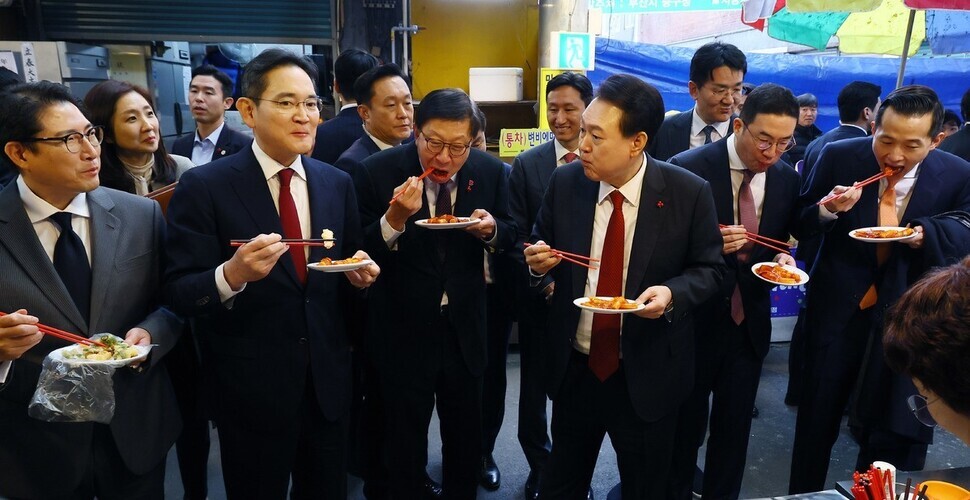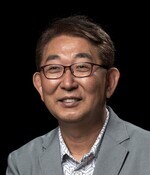hankyoreh
Links to other country sites 다른 나라 사이트 링크
[Column] Are chaebol firms just pizza pies for families to divvy up as they please?


By Kwack Jung-soo, senior staff writer at Hankyoreh Economy & Society Research Institute
While most of the public was distracted by the general election, South Korea’s major conglomerates announced a succession of internal corporate reforms. Hanwha Corporation, effectively the holding company of Hanwha Group, South Korea’s seventh-largest financial firm, and Hanwha Aerospace, the conglomerate’s defense affiliate, both announced plans to transfer, split off or spin off non-essential business divisions. Hyosung Corporation, Korea’s 31st-largest financial firm, also announced plans to spin off its holding firm Hyosung Group into two separate holding firms.
Corporations changing their management structure for business reasons is nothing new. Both Hanwha and Hyosung have emphasized selectiveness and concentration, management efficiency, synergy and competitiveness. Yet no investor actually takes their announcements at face value. The management and ownership reshuffle and spinoffs are not for reasons of efficiency or profit, but to better enable chaebol inheritors to retain effective control. It’s a strategy that’s been utilized by the chaebol for generations. After the death of its honorary chairman, Cho Seok-rae, Hyosung Group was handed over to his son Cho Hyun-joon. Cho is divvying up control over the group with his siblings, utilizing the usual strategies of spinoffs and divisions. It’s all fait accompli.
The way Korea’s chaebol families blatantly use affiliate spinoffs to secure inherited control over conglomerates is rarely seen in other advanced economies. South Korea has a long history of people treating mega-corporations and conglomerates in the same light as family businesses, allowing the chaebol to pass down control over the country’s mega-firms as if they were laundromats, fried chicken joints or other “family-owned assets.”
A little more than 10 years ago, I traveled to Germany to report on the country’s hidden champion, relatively small but extremely successful firms that are effectively unknown to most of the public — whether it be through inconspicuousness or secrecy. I asked local entrepreneurs and businessmen about their thoughts on South Korea firms utilizing spinoffs and divisions to retain family control over conglomerates. They were all very surprised when I told them about what’s common practice in Korea. Dividing up a corporation to boost the controlling shareholder’s profits was unimaginable to them — equated to professional malfeasance or negligence.
Some people say that as long as splitting up the firm doesn’t hurt retail shareholders and break the law, there isn’t any problem. Yet most experts agree that the nature of most corporate restructurings makes the interests of retail shareholders vastly different from those of controlling shareholders. Capital transactions such as corporate divisions, acquisitions, and the transfer of control and assets are largely a zero-sum game. If one end of the transaction benefits, the other end loses out.
The truth behind the corporate restructuring of the Hyosung Group first reared its head in the spinoffs back in 2018. The Hyosung Group transitioned into a holding firm system by spinning off into four subsidiaries, including its holding firm Hyosung Corporation (surviving firm) and Hyosung TNC. Hyosung publicly justified the spinoffs by claiming they were to raise Hyosung’s enterprise value and increase competitiveness, but the only people who really benefited from the restructuring were Cho Hyun-joon and his family.
The Cho family controlled 38% of shares in the old Hyosung. In the aftermath of the spinoffs, strategies involving contributions in kind and paid-in capital increases raised that figure to 55%. Because this was a zero-sum game, the shares of retail investors diminished as the Chos’ shares increased. In summary, the chaebol family increases its shareholdings and then splits up the conglomerate to consolidate control and allocate it among family members.
The controversy surrounding the Samsung C&T merger was rooted in the resulting consolidation of control in Samsung Group Chairman Lee Jae-yong and the Lee family — not to mention the highly suspicious accounting methods used to achieve the merger. To use the Hyosung example, the Lee family increased its shareholdings. Then they implemented a merger deal with Samsung C&T, with the Lee siblings sharing control over the resulting spinoffs.
Right now, it’s safe to say that all third- and fourth-generation chaebol heirs are experiencing a similar temptation. Even the chaebol need to change with the times, and today’s times demand a new management paradigm.
The Wallenberg family, Sweden’s wealthiest family empire, has successfully passed down corporate control over its various enterprises for five generations, spanning 170 years of family management. Yet they’ve never used spinoffs. Instead, each generation selects the two most competent family members to run their firms.
I’m not going to sit here and advocate some democratic socialist vision, where corporations are not private property but social and employee assets. But corporations and conglomerates are not just pizza pies for the chaebol families to divide up amongst themselves.
Fed up with the Yoon Suk-yeol administration, the Korean public awarded the opposition Democratic Party with a comfortable parliamentary majority in last week’s general election. While this may put the brakes on Yoon’s my-way-or-the-highway brand of national leadership, our troubles are far from over — especially when it comes to the economy.
Leading up to the election, the Yoon administration and the ruling party endlessly threw out empty promises. The “corporate value-up program” designed to solve the Korean discount (domestic stocks having lower value than overseas counterparts) is full of risks that could lead the country to bankruptcy. Focusing on tax policies and subsidies without addressing the foundational problems of backwards, anachronistic corporate management structures is like pouring water into a bucket with a hole in the bottom.
Restructuring a corporation to simply increase the profits of the controlling shareholder is something that a functional board of directors would shut down immediately. The boards of directors at Korean conglomerates, therefore, are clearly dysfunctional. They, too, are the result of a backwards corporate control structure. In 2020, Democratic Party lawmaker Lee Yong-woo issued a bill to reform listed firms by forcing companies to earn the consent of its retail shareholders before implementing mergers, spinoffs, and transfers of management control. The bill also forbade the majority shareholder (chaebol chairman) and special interest parties (chaebol family members) from having a vote in shareholder meetings regarding mergers and spinoffs. If the Yoon administration really wants to solve the Korean discount, they must improve the structural problems behind South Korean corporations.
Please direct questions or comments to [english@hani.co.kr]

Editorial・opinion
![[Editorial] Penalties for airing allegations against Korea’s first lady endanger free press [Editorial] Penalties for airing allegations against Korea’s first lady endanger free press](https://flexible.img.hani.co.kr/flexible/normal/500/300/imgdb/original/2024/0502/1817146398095106.jpg) [Editorial] Penalties for airing allegations against Korea’s first lady endanger free press
[Editorial] Penalties for airing allegations against Korea’s first lady endanger free press![[Editorial] Yoon must halt procurement of SM-3 interceptor missiles [Editorial] Yoon must halt procurement of SM-3 interceptor missiles](https://flexible.img.hani.co.kr/flexible/normal/500/300/imgdb/child/2024/0501/17145495551605_1717145495195344.jpg) [Editorial] Yoon must halt procurement of SM-3 interceptor missiles
[Editorial] Yoon must halt procurement of SM-3 interceptor missiles- [Guest essay] Maybe Korea’s rapid population decline is an opportunity, not a crisis
- [Column] Can Yoon steer diplomacy with Russia, China back on track?
- [Column] Season 2 of special prosecutor probe may be coming to Korea soon
- [Column] Park Geun-hye déjà vu in Yoon Suk-yeol
- [Editorial] New weight of N. Korea’s nuclear threats makes dialogue all the more urgent
- [Guest essay] The real reason Korea’s new right wants to dub Rhee a founding father
- [Column] ‘Choson’: Is it time we start referring to N. Korea in its own terms?
- [Editorial] Japan’s rewriting of history with Korea has gone too far
Most viewed articles
- 160% of young Koreans see no need to have kids after marriage
- 2Presidential office warns of veto in response to opposition passing special counsel probe act
- 3[Editorial] Penalties for airing allegations against Korea’s first lady endanger free press
- 4Hybe-Ador dispute shines light on pervasive issues behind K-pop’s tidy facade
- 5S. Korea “monitoring developments” after report of secret Chinese police station in Seoul
- 6Months and months of overdue wages are pushing migrant workers in Korea into debt
- 7OECD upgrades Korea’s growth forecast from 2.2% to 2.6%
- 8Inside the law for a special counsel probe over a Korean Marine’s death
- 9Japan says it’s not pressuring Naver to sell Line, but Korean insiders say otherwise
- 10[Exclusive] Hanshin University deported 22 Uzbeks in manner that felt like abduction, students say